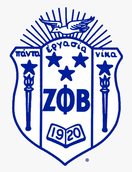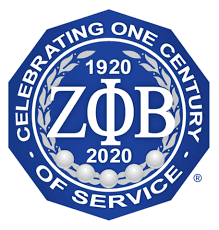One Zeta…Unified…Mobilized…ZetariZed!!! |

Zeta Phi Beta Sorority, Inc. was founded on January 16th, 1920 at Howard University by five co-eds, Arizona Cleaver, Myrtle Tyler, Viola Tyler, Fannie Pettie and Pearl Neal. The organization was founded on the simple belief that sorority elitism and socializing should not overshadow the real mission for progressive organizations to address societal mores, ills, prejudices, poverty, and health concerns of the day. These five women dared to depart from the traditional coalitions for black women and sought to establish a new organization predicated on the precepts of Scholarship, Service, Sisterhood and Finer Womanhood.
Today, the sorority consists of over 100,000 women in more than 800 chapters in the United States and abroad. The sorority's national and local programs include endowment of its National Educational Foundation, the Stork's Nest Prenatal Program, Z-HOPE - an empowerment program that aims to enrich the mind, body and soul of target populations, and supporting multiple affiliate organizations. Zeta Chapters and auxiliary groups have given un-totaled hours of voluntary service to educate the public, assist youth provide scholarships, support organized charities and promote legislation for social and civic change.
Since its inception, the sorority has chronicled a number of firsts. For example, Zeta Phi Beta was the first Greek Letter organization to charter a chapter in Africa (1948), to form adult and youth auxiliary groups, to centralize its operations in a National Headquarters ,and to be constitutionally bound to a brother fraternity, Phi Beta Sigma Fraternity, Inc.
Today, the sorority consists of over 100,000 women in more than 800 chapters in the United States and abroad. The sorority's national and local programs include endowment of its National Educational Foundation, the Stork's Nest Prenatal Program, Z-HOPE - an empowerment program that aims to enrich the mind, body and soul of target populations, and supporting multiple affiliate organizations. Zeta Chapters and auxiliary groups have given un-totaled hours of voluntary service to educate the public, assist youth provide scholarships, support organized charities and promote legislation for social and civic change.
Since its inception, the sorority has chronicled a number of firsts. For example, Zeta Phi Beta was the first Greek Letter organization to charter a chapter in Africa (1948), to form adult and youth auxiliary groups, to centralize its operations in a National Headquarters ,and to be constitutionally bound to a brother fraternity, Phi Beta Sigma Fraternity, Inc.



